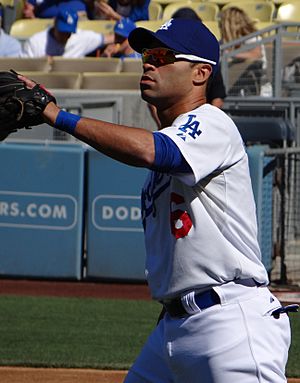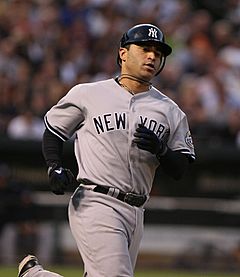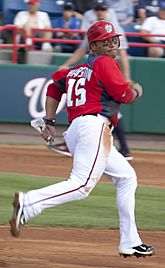Jerry Hairston Jr. facts for kids
Quick facts for kids Jerry Hairston Jr. |
|||
|---|---|---|---|

Hairston with the Los Angeles Dodgers in 2012
|
|||
| Infielder / Outfielder | |||
| Born: May 29, 1976 Des Moines, Iowa, U.S. |
|||
|
|||
| debut | |||
| September 11, 1998, for the Baltimore Orioles | |||
| Last appearance | |||
| September 25, 2013, for the Los Angeles Dodgers | |||
| MLB statistics | |||
| Batting average | .257 | ||
| Home runs | 70 | ||
| Runs batted in | 420 | ||
| Teams | |||
|
|||
| Career highlights and awards | |||
|
|||
Jerry Wayne Hairston Jr. (born May 29, 1976) is a former professional baseball player from the United States. He played for 16 seasons in Major League Baseball (MLB). Jerry was a versatile player, meaning he could play almost any position on the field. He played for many teams, including the Baltimore Orioles, New York Yankees, and Los Angeles Dodgers. His family has a long history in baseball, with his grandfather, father, and brother all playing in the major leagues too!
Becoming a Baseball Star
High School and College Years
Jerry Hairston Jr. went to Naperville North High School in Illinois. He was a fantastic athlete, earning top honors in baseball twice. He was also a great basketball player. After high school, the Baltimore Orioles drafted him in 1995. But Jerry decided to go to college first.
He played college baseball at Southern Illinois University in 1996 and 1997. He was a very good hitter, with a batting average of .360 during his college career. In 1996, he was named the best freshman player in his conference. He also played summer baseball in the Cape Cod Baseball League, which is a league for top college players. Years later, in 2009, he was honored in the Saluki Hall of Fame for his college achievements.
Starting His Professional Journey
The Baltimore Orioles drafted Jerry again in 1997. He started his professional career as a shortstop. In his first year, he hit .330 in 59 games. He quickly moved up through the minor league teams. By 1998, he was playing second base. He played so well that he made his major league debut with the Orioles on September 11, 1998. He mostly played as a pinch runner or a late-game defender that year.
In 1999, Jerry started in Triple-A, which is just one step below the major leagues. He was called up to the Orioles in June. He hit .277 with two home runs. He got his first major league hit and first home run that year. The Orioles hoped he would be their main second baseman in 2000. However, a shoulder injury kept him out for part of the season.
In 2001, Jerry was the Orioles' starting second baseman. He played in 159 games, hitting .233 with 29 stolen bases. He was known for his exciting style of play. In 2003, he started the season very well, hitting .287 and stealing many bases. But he broke his foot in May, which needed surgery. This injury kept him out for most of the season. In 2004, he broke his finger and later his ankle, which also cut his season short.
Playing for Different Teams
Chicago Cubs and Texas Rangers
In 2005, Jerry was traded to the Chicago Cubs. He played in the outfield and at second base. He hit his first career grand slam in a game against the Pittsburgh Pirates. He played for the Cubs until May 2006, when he was traded to the Texas Rangers. He played 63 games for the Rangers that year. He stayed with the Rangers for the 2007 season as a reserve player.
Cincinnati Reds and World Baseball Classic
In 2008, Jerry signed with the Cincinnati Reds. He had a great season, hitting .326 and stealing 15 bases, even though he missed time due to injuries. He credits his manager, Dusty Baker, for helping him improve. In 2009, he re-signed with the Reds.

Jerry also represented Mexico in the 2009 World Baseball Classic. His mother was born in Mexico, which made him eligible to play for their team. He played alongside his brother, Scott Hairston, in this international tournament.
New York Yankees and World Series Win
On July 31, 2009, Jerry was traded to the New York Yankees. This move helped the Yankees add depth to their team. He quickly made an impact. On October 17, 2009, he got his first hit in a playoff game. He also scored the winning run in a long 13-inning game against the Angels. This helped the Yankees win that series. He was part of the Yankees team that won the 2009 World Series!
San Diego Padres and Washington Nationals
In 2010, Jerry signed with the San Diego Padres. He played on the same team as his brother, Scott Hairston. He played shortstop and second base for the Padres. He hit a career-high 10 home runs that season. However, his season was cut short by an elbow injury and a broken leg.
In 2011, Jerry joined the Washington Nationals. He became their starting third baseman for a while. He missed some time with a broken wrist. He played in 75 games for the Nationals, hitting .268.
Milwaukee Brewers and Los Angeles Dodgers
Later in 2011, Jerry was traded to the Milwaukee Brewers. He helped the team in their playoff run. In the National League Championship Series, he had a key double and scored an important run. He played very well in the playoffs, hitting .385.
In 2011, the Los Angeles Dodgers signed Jerry to a two-year contract. On June 1, 2012, Jerry was part of a special Dodgers lineup. It was the first time in MLB history that a team's starting infield was made up entirely of sons of former major league players! Jerry played many different positions for the Dodgers. In 2012, he had hip surgery, which ended his season early. He played his final season in 2013, mostly as a reserve player.
Life After Playing Baseball
Broadcasting Career
After retiring as a player, Jerry Hairston Jr. didn't leave baseball completely. On December 11, 2013, it was announced that he would join the Dodgers' broadcasting team. He now works on the pre-game and post-game shows for SportsNet LA, sharing his baseball knowledge with fans.
Personal Life and Family
Jerry Hairston Jr. comes from a very unique baseball family. His brother, Scott Hairston, also played professional baseball. His father, Jerry Hairston Sr., his uncle, Johnny Hairston, and his grandfather, Sam Hairston, were all major league players too! This makes the Hairston family one of the few families with three generations of MLB players. Jerry became a Jehovah's Witness in 2000.
See also
- Third-generation Major League Baseball families


